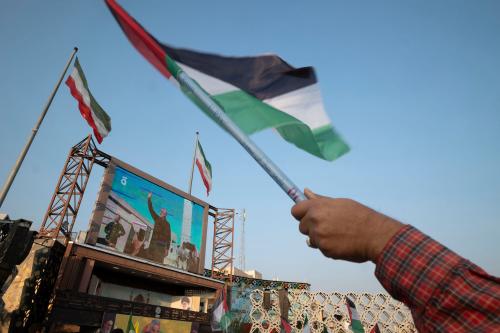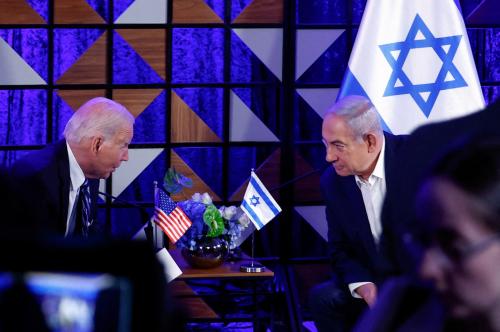President Bush says 2002 will be “a war year.” The question is, what kind of war will it be?
In the three months since the United States began bombing Afghanistan, America has fought its war on terrorism in a literal sense. In just 11 weeks, Al-Qaida’s training bases were destroyed, the Taliban routed and a new government installed in Kabul.
But America’s victory in Afghanistan is incomplete. Osama bin Laden and many Al-Qaida fighters appear to have escaped. Taliban leader Mullah Mohammad Omar has fled to the mountains. And the task of stabilizing the war-torn country has only just begun.
U.S. battlefield successes also mask how much more needs to be done in the war on terrorism. Al-Qaida continues to maintain “sleeper cells” in dozens of countries. America remains highly vulnerable to a terrorist attack. And bin Laden’s hatred of the United States still resonates in much of the Islamic world.
Bush has repeatedly warned Americans that the war on terrorism could take a long time, but he has seemed to define that battle mostly in military terms. That focus can be deceptive. The temptation is to believe that the war is almost over?that one or two more military successes, in places like Baghdad or Mogadishu, will make us safe.
The reality is quite different. Washington has taken some steps to increase security at home, but so little has been accomplished that a Florida man recently carried a loaded pistol aboard two Delta flights before being discovered while boarding a third. Even less has been done to address the critical question of how we win the hearts and minds of the world’s multitudes who live in squalor and are easy prey to hatemongers like bin Laden. Unless we change their minds, we will never be safe in a globalized world where disadvantaged people can see our wealth?and lash out at us more easily.
Our actions in this new year will determine whether America’s leaders, and its people, understand the complexity of the challenge we face. Will we stay focused on the threat long enough to take the steps needed to prevent more terrorist attacks? Will we take the time to discuss whether increased foreign aid and a more liberal trade policy will help reduce the hatred that fuels terrorism? And will we be willing to hold our key allies in the Middle East to the human rights standards we espouse, even if doing so endangers our access to cheap oil?
A Military Success?
When the United States went to war in Afghanistan, many feared the worst. Famine would kill thousands of Afghans. The Arab street would rise up against any government that helped us. Islamist extremists would seize control of Pakistan. And the United States would become mired in a Vietnam-like quagmire as it fought battle-hardened Taliban and Al-Qaida forces.
None of this came to pass. Massive food deliveries staved off a humanitarian disaster. The Arab street has been silent. Pakistani President Pervez Musharraf has strengthened his hold on power. The Taliban collapsed.
America prevailed on the battlefield because of a novel combination of precision air power, special-forces operations, and Afghan proxy armies on the ground. But this success should not have been surprising. The Taliban’s hold on power was fragile. Many of its fellow citizens hated the Taliban, and none of its neighbors came to its aid.
More important, the war pitted the world’s superpower against a regime protected by a few tens of thousands of Kalashnikov-toting fighters driving Toyota pickup trucks. “This was the most incompetent adversary the United States has fought since the Barbary pirates,” retired Gen. Wesley K. Clark told the New York Times. “They had no understanding of U.S. military capability.”
But even America’s impressive military successes did not produce total victory?at least so far. Relying on proxies to capture Tora Bora rather than using our own troops may have enabled bin Laden and most of his chief lieutenants to escape. Al-Qaida may well be able to find refuge elsewhere in the Islamic world?and with that, the opportunity to plot more terrorist attacks.
A free Mullah Omar, meanwhile, poses a threat to any Afghan government. President Bush says U.S. forces will stay until the remaining Al-Qaida and Taliban forces are destroyed. But in a country long hostile to foreigners, the United States risks wearing out its welcome before the task is done.
Beyond Bombs
The biggest accomplishment of the war so far?the Taliban’s removal from power?not only put Afghanistan off-limits as a place for terrorists to shelter, but also will probably deter some other governments from supporting such groups. But the success has also fueled the desire for revenge among Islamist extremists. And that has increased the need for the administration to think about non-military strategies to combat terrorism.
So far, those strategies haven’t gotten much attention.
Some progress has been made in tracking terrorists. Sept. 11 produced unprecedented law enforcement and intelligence cooperation, which has led to the arrests of Al-Qaida members in Hamburg, Germany; Paris; and Madrid. Some countries, such as Sudan, that once supported terrorists now share critical intelligence.
Washington has made far less progress in reducing America’s vulnerability to attack and combating anti-Americanism.
President Bush put former Pennsylvania Gov. Tom Ridge in charge of coordinating government agencies in the fight against terrorism at home. Washington doubled spending on homeland defense last year, and spending is likely to double again this year. Much of the money is dedicated to enhancing aviation security and defenses against anthrax and other bioterrorist threats.
But we have yet to systematically tackle our multitude of other vulnerabilities, which range from nuclear facilities and chemical plants to computer networks and our food supply. Consider container ships. Only 2 percent of the 33 million containers offloaded in U.S. ports each year are searched thoroughly. If just one contained deadly sarin gas rather than Nintendo games, Los Angeles or New York City could be devastated.
And because everything from automobile manufacturing to computer sales relies on the timely arrival of imported goods, the inevitable shipping disruptions could send our economy into a tailspin.
Washington has made even less headway in winning the hearts and minds of those who see us as a high-tech bully that backs repressive governments and does little to improve the lot of the world’s have-nots. Their seething resentment helps explain why terrorists who seem so obviously evil to us can find support.
The first challenge in tackling anti-Americanism is to rebuild Afghanistan. If not, we are likely to face a new generation of Afghans angry that we abandoned their country after our immediate interests were served, much as we did after our proxy war against the Soviets.
Rebuilding will not be easy in a country where warlords again wield power and where the new government is so poor it had to ask the United Nations to provide ministers with phones, faxes, computers?and the desks to put them on. Washington has said little about what it will do to put Afghanistan back together.
The larger problem, though, is that Washington remains tone-deaf to the growing gap between the wealthy West and the rest of the world.
The United States ranks dead last among industrialized countries when it comes to giving non-military foreign aid as a percentage of gross national product. And its trade policy frequently harms fledgling industries in developing countries. Indeed, under pressure from American apparel manufacturers, the Bush administration reneged on promises it made immediately after Sept. 11 to allow more Pakistani textiles into the U.S. market, even though Pakistan’s economic and political stability is clearly a vital American interest.
Beyond that, our commitment to human rights continues to take a back seat to our economic interests in the Middle East.
The State Department has responded to anti-Americanism, in part, by launching an advertising campaign designed to bolster America’s image in the world. Led by Charlotte Beers, a former Madison Avenue advertising executive who peddled Uncle Ben’s Rice, the campaign is developing clever print ads, heart-rending public-service announcements for radio and television, and user-friendly Web sites to improve America’s “brand” reputation.
But slick advertising will not defang those who preach hatred of the United States, especially when those we most want to reach live in societies with no free speech, and where open media and Internet access are unimaginable luxuries.
Tough Decisions
Resisting the siren’s call to rely on military force alone to solve our problems will not be easy. The results of bombing raids are readily apparent. The same is seldom true of other strategies for combating terrorism. The fruits of intelligence cooperation are often hidden from view. And we can debate how much any efforts to promote economic development will rob bin Laden and others like him of the moral high ground they claim to hold.
Just as important, broadening our response to terrorism poses costs some Americans might prefer not to pay. Billions of dollars will be needed to protect our chemical plants and computer networks. Allowing more Pakistani textiles into the United States would increase the prospects for a stable Pakistan, but would also put some American textile workers out of work.
Insisting that our Persian Gulf allies respect human rights may also come with a price?the overthrow of an otherwise-friendly regime and an increase in what we pay for gasoline at the pump.
In the end, 2002 may test Americans and their leaders as profoundly as 2001 did. Will we be wise enough to recognize there are no quick fixes to the scourge of terrorism? Will we be willing to override parochial interests to pursue policies that promote the common good?
If we aren’t, 2002 may be remembered as the war year in which we let true victory slip away.



Commentary
Op-edUnfinished Business
January 6, 2002